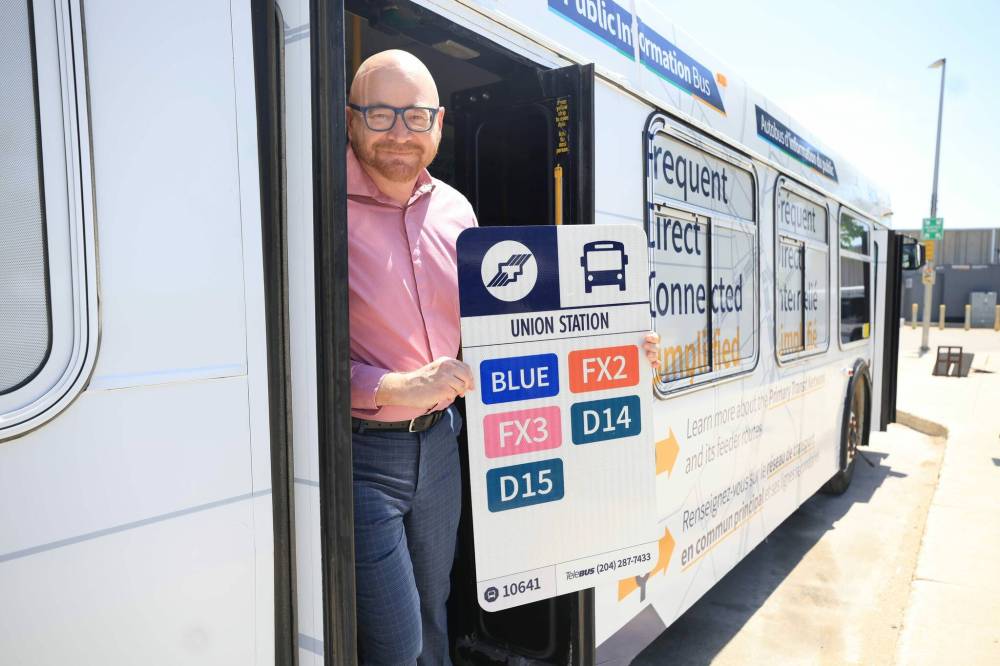Transit users can’t wait a year for system fixes
Advertisement
Read this article for free:
or
Already have an account? Log in here »
To continue reading, please subscribe:
Monthly Digital Subscription
$1 per week for 24 weeks*
- Enjoy unlimited reading on winnipegfreepress.com
- Read the E-Edition, our digital replica newspaper
- Access News Break, our award-winning app
- Play interactive puzzles
*Billed as $4.00 plus GST every four weeks. After 24 weeks, price increases to the regular rate of $19.95 plus GST every four weeks. Offer available to new and qualified returning subscribers only. Cancel any time.
Monthly Digital Subscription
$4.99/week*
- Enjoy unlimited reading on winnipegfreepress.com
- Read the E-Edition, our digital replica newspaper
- Access News Break, our award-winning app
- Play interactive puzzles
*Billed as $19.95 plus GST every four weeks. Cancel any time.
To continue reading, please subscribe:
Add Free Press access to your Brandon Sun subscription for only an additional
$1 for the first 4 weeks*
*Your next subscription payment will increase by $1.00 and you will be charged $16.99 plus GST for four weeks. After four weeks, your payment will increase to $23.99 plus GST every four weeks.
Read unlimited articles for free today:
or
Already have an account? Log in here »
It probably wasn’t meant to be as dismissive as it sounded.
But here’s Bjorn Radstrom, the manager of service development with Winnipeg Transit: “We probably get something like one commendation for every 100 complaints, it’s just the way it always is … And we’re probably pretty close to that right now, the only difference is that now we’re hearing 10 or 15 times as many of each as before, because of the nature of the change.”
Radstrom spoke to the media after a meeting with city councillors to talk about concerns with Winnipeg Transit’s massive route overhaul, which came into place on June 29.

Ruth Bonneville / Free Press
Bjorn Radstrom, Manager of Transit Service Development
“The value in today’s meeting is with helping the councillors to understand that we are listening and we’re reading all this feedback, and we’re plotting out how we’re going to address it — we do care about this, and we want to deal with this,” Radstrom said. “The thing that we don’t want to do is, after it’s been in place for only a month, is just react initially to what people’s first reactions are, because once people settle into routines on the new network, they might have different feedback.”
That’s absolutely true — as potential users learn more and more about the system and the way it works, early, knee-jerk, change-resistant instincts and impressions may well change. Rushing in to react to first impressions may well lead to the creation of new problems.
But the timeline for addressing real issues, for those customers who have seen their traditional routes vanish, is frankly ridiculous. Why? Because Radstrom argues the “absolute earliest” changes can be made to the system is next summer.
By then, the damage will be long since done.
The problem is that, for many users, Transit is an essential service. Getting to work and school is not as simple as “well, Transit no longer operates my route when I get out of work, so I can just take an Uber or drive my car to work.” This is especially true for workers in low-paying jobs, and especially those who work different shifts — one of the primary complaints about the new system is that many routes shut down at 11 o’clock at night — others even earlier — giving workers with shifts beyond that time frame no options.
Frankly, this looks more like riding out a complaints storm than effectively dealing with problems. Saying you are examining obvious issues but don’t intend to address them for another 11 months is hardly customer service — it’s more like customer disservice.
Because customers don’t have a year for the system to address their needs.
It brings to mind the saying “A bird in the hand is worth two in the bush.”
Why? Because one of the goals of the overhaul is to bring in more riders to a financially challenged transit system.
And within that financially challenged system, you would think a dedicated, regular Transit user would be the gold standard of customer. Someone who pays for Transit week in and week out, based on regular fares, pays about $1,600 a year for their commute, or about $1,400 if they opt for monthly bus passes. The one kind of customer you’d bend over backwards to try and keep.
The fact is that if those customers can no longer use transit, they’re not just going to wait. Their bosses are not going to accept an 11 month delay for Transit to possibly improve its system, all the while saying, “Go ahead, leave early so you can catch the bus.”
Winnipeg Transit needs those customers, and those customers need Transit that works for them now, not in July of 2026.






